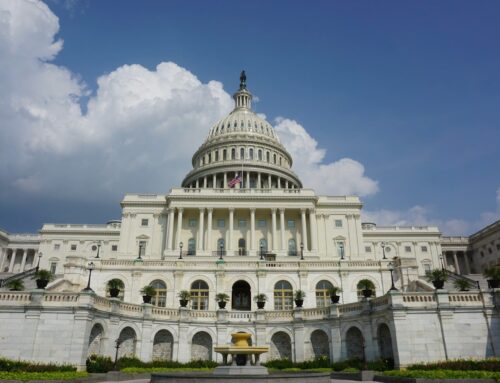Given our mission here at Taxpayers for Common Sense, we spend a lot (almost all?) of our time thinking about how decisions are made about investments of our tax dollars. Article I of the Constitution gives all legislative powers to Congress – including the sole responsibility for writing the legislation that collects revenue and funds the activities of the federal government.
The Constitution grants no other entity spending authority, and the language makes it clear that is no accident. “No Money shall be drawn from the Treasury, but in Consequence of Appropriations made by Law.” Years of legislative precedent and practice has concentrated those powers in the Appropriations Committees which write the bills that are, if things are working as they should, eventually voted on by all the members.
This doesn’t mean the executive agencies have to get Congressional approval every time they want to buy a pencil. The president is expected to “recommend to [Congress] measures as he shall judge necessary and expedient” which of course can and does include an annual budget proposal for Congress to consider. And Congress routinely delegates limited authority to each agency about how and where it can spend money. Sometimes those directions are very specific (cough, earmarks, cough) and sometimes they are much broader (a big pile of cash in the Overseas Contingency Operations – slush fund – account). But there are clear limits to that discretion, both in the laws that govern each agency, both the text and reports that accompany the annual spending bills, and the little known (and excitingly titled?) Antideficiency Act, which states, in part: “An officer or employee of the United States Government or of the District of Columbia government may not involve either government in a contract or obligation for the payment of money before an appropriation is made unless authorized by law.” (Emphasis added.) Just in case the Constitution wasn’t clear enough.
Unfortunately, this administration is testing the limits of this law. Last week we wrote about the recent push by the Trump Administration to use money appropriated by the Congress for the Pentagon to build a wall on the southern border.
These efforts have been varied: from outright asking the Congress to “reprogram” appropriated funds, through tricky legislative maneuvers by “self-executing rules”, to the president invoking an emergency declaration that supposedly requires the use of U.S. military troops to build the wall. (And would, by the way, rescind funding for a whole bunch of military construction projects to pay for it.) While the courts are considering a challenge to one of these maneuvers, the administration is moving forward with its plans.
Wall funding isn’t the only area where we are seeing tricky efforts to spend money in ways other than how Congress intended. The Inspector General for the Department of Agriculture (USDA) just identified two possible Antideficiency Act violations regarding attempts to move two USDA sub agencies out of Washington. For years annual appropriations bills have prohibited USDA from reprogramming appropriated funds for various purposes including relocating employees or reorganizing agencies. That is UNLESS the Secretary of Agriculture “notifies in writing and receives approval from the Committee on Appropriations” the intention to do so. In starting to move the Economic Research Service (ERS) and the National Institute of Food and Agriculture (NIFA), the secretary did notify the committees, but then started paying contractors to evaluate proposals for the relocation before he received “committee approval.” In the case of NIFA, Congress actually appropriated $6 million for reorganization, so USDA should have been in the clear. But the violation occurred because USDA blew past the 60-day deadline for providing a report on how they planned to spend the cash. They provided a report on day 139, but had already started spending cash. That’s not how this works.
Why do we care at TCS? There are important Constitutional principles regarding the separation of powers under attack. While these breaches may seem small in the overall context, they loom large. The founders’ vision was to – with appropriate checks and balances from the executive and judicial branches – explicitly grant Congress the most powers because it is the branch of government that most directly represents the people. It doesn’t matter if it is approving treaties, declaring war, or deciding on spending – Congress gets a say. Setting priorities for investments is the lawmakers’ job.
Legislating is hard and often messy. Democracy, and federal budgeting, is slow, painful, and often results in compromises where seemingly nobody gets much of what they want.
The repeated attempts to end run the will of the Congress and spend money on items other than those enumerated in the appropriations bills are in violation of both the law and the Constitution. The Executive branch, regardless of which party or person is at its head, needs to come in the front door of the Capitol and do the hard work and compromise necessary to achieve some or all of their policy goals instead of relying on back door maneuvers. That’s how this is supposed to work.











Get Social